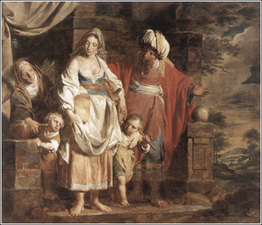Five Robust Gay Analogies
Which Strongly Validate
Gay Relationships
Our first four gay analogies: 1. The Analogy of Gentile Inclusion and 2. The Analogy of Slavery and 3. The Analogy of Women In Ministry and 4. The Analogy of Divorce and Remarriage, are sometimes criticized as having little in common with homosexual relationships.
 |
Abraham, Sarah, Hagar
and their children
We agree that our first four analogies better illustrate how the church (not scripture), changes over time, as she interacts with the culture, rather than strongly validating homosexual practice.
 |
As anti-gay evangelical author Dr. Robert Gagnon points out on his website:
"The proper purpose of engaging in analogical reasoning is to assess what categories best fit the issue in question through comparison-cases that share the greatest number of correspondences."
Dr. Gagnon made two DVDs dealing with the subject of Homosexuality entitled, Truth in Love, The Bible and Same Sex Behavior. On these DVDs, Dr. Gagnon is interviewed by Dr. Merton Strommen, a Lutheran scholar. On his DVDs, Dr. Gagnon challenges gays to come up with Biblical analogies which share enough correspondences to make them suitable to prove the case for gay partnerships.
Therefore we present five robust analogies in scripture which closely correspond to and validate homosexual relationships which are within the Biblical moral framework: committed, faithful, non-cultic.
These five robust gay analogies sharpen our focus and point us to scriptural, Bible based conclusions regarding homosexual practice.
Since homosexual practice frequently includes the following criteria, when we seek gay analogies in scripture which validate homosexual practice, the gay analogies we use must include these criteria.

Biblical Criteria For Five
Additional Gay Analogies
- The analogy must involve lifelong, unrepentant sexual behavior.
- The analogy must include a marriage relationship not universally accepted in scripture.
- The analogy must include a relationship regarded with some degree of revulsion in scripture.
- The analogy must be drawn from a relationship which, nevertheless, was blessed by God.
If our next five analogies meet these criteria, we may safely conclude that God blesses homosexual relationships, because He blessed these corresponding heterosexual relationships.
1. The Analogy of Abraham and Sarah
 |
Abraham and Sarah were brother and sister. They shared the same father but different mothers. They lived their entire adult lives in a sexual, married relationship.
“And Abraham said of Sarah his wife, She is my sister... And yet indeed she is my sister; she is the daughter of my father, but not the daughter of my mother; and she became my wife.” Genesis 20:2, 12.
The Levitical Holiness Code clearly forbids a brother having a sexual relationship with his sister. In the Bible,“uncover her nakedness” is a euphemism for having sex.
“The nakedness of thy sister, the daughter of thy father’s wife shalt thou not uncover... the nakedness of thy father’s wife’s daughter, begotten of thy father, she is thy sister, thou shalt not uncover her nakedness.” Leviticus 18:9-11.
“And if a man shall take his sister, his father’s daughter, or his mother’s daughter, and see her nakedness, and she see his nakedness; it is a wicked thing; and they shall be cut off in the sight of their people: he hath uncovered his sister’s nakedness; he shall bear his iniquity.” Leviticus 20:17.
 |
The forbidden, incestuous, marriage between Abraham and Sarah, described in Leviticus 20:17 as a wicked thing, fits all four criteria, making a strong analogy to gay relationships.
a) The analogy must include lifelong, unrepentant sexual behavior.
Abraham and Sarah enjoyed a long happy marriage, including an active sexual relationship at least into their 90s, which produced their son Isaac.
b) The analogy must include a marriage relationship not universally accepted in scripture.
The type of marriage Abraham and Sarah enjoyed is said to be towebah, an abomination under the Law, Leviticus 18:26-30, yet clearly, their relationship is not regarded by God as abomination before the Law was given. Abraham and Sarah lived 400 years before the Law of Moses.
c) The analogy must include a relationship regarded with some degree of revulsion in scripture.
The curse of God was on this forbidden relationship according to Deuteronomy 28:22.
 |
“Cursed be he that lieth with his sister, the daughter of his father, or the daughter of his mother. And all the people shall say, Amen.”
Abraham and Sarah lived their lives in an incestuous marriage which was a wicked abomination under the Levitical Holiness Code and was cursed by God in Deuteronomy 28, yet Abraham was blessed by God, not cursed.
If they were alive today, Abraham and Sarah, the abominable, wicked, cursed, incestuous polygamists, would not be invited to speak at Focus on the Family.
Instead, many Christians would attack them for their incestuous relationship, just like they attack homosexual relationships.
Abraham would be vilified for his polygamous relationships with Hagar, Keturah and the concubines. It's not difficult to imagine Dr. Dobson inveighing against Abraham’s incest on Larry King Live or Focus On The Family radio.
Yet, in spite of our modern views against incestuous marriage between brother and sister, nothing in scripture indicates God had a problem with Abraham and Sarah’s relationship. In fact, at the time God made His unconditional covenant with Abraham, Genesis 15:18, Abraham was already in the incestuous marriage relationship with his sister.
Far from breaking up their relationship, God intervened to help them have a child together and extended His everlasting covenant to include their child, Isaac and his descendants.
d) The analogy must be drawn from a relationship blessed by God.
Three times in scripture Abraham is called the friend of God, 2 Chronicles 20:7, Isaiah 41:8, James 2:23. He is listed as a hero of faith in Hebrews 11. He is the father of Jewish and Christian believers in Romans and Galatians. God blessed Abraham’s incestuous relationship with Sarah, putting their son Isaac into the genealogy of Christ.
Our Scriptural, Bible Based Conclusion.
 |
Because our analogy of the marriage of Abraham and Sarah meets the strict criteria and because God blessed Abraham and Sarah’s forbidden relationship,
we conclude that God can and does bless loving homosexual relationships.
The following four Gay Analogies are also covered in detail in our 378 page eBook
Gay Christian 101 - Spiritual Self-Defense For Gay Christians can be ordered now.
2. The Gay Analogy Of Amram and Jochebed
3. The Gay Analogy Of Jacob, Leah and Rachel
4. The Gay Analogy Of Interracial Marriage
5. The Gay Analogy Of Polygamy
These strong Biblical Analogies defend and validate gay relationships which are
committed, faithful and non-cultic.
The Analogy of Amram and Jochebed.
From Gay Analogies, return to GayChristian101.com Homepage.
Google Translate
into 90 languages
We are saved:
by grace alone through faith alone
Recent Articles
-
Gay Christian 101 - Affirming God's glorious good news for all LGBs.
Jan 08, 24 12:57 AM
Gay Lesbian Bisexual Christian 101 - Accurate biblical and historical info defending LGB Christians from the anti-gay crowd. -
Romans 1 describes ancient shrine prostitution, not gays and lesbians.
Dec 21, 23 04:37 PM
Romans 1, in historical context, is about ancient Roman fertility goddess worshipers who engaged in shrine prostitution to worship Cybele, not gays and lesbians. -
The Centurion And Pais - When Jesus Blessed A Gay Couple.
Nov 14, 23 10:32 PM
Centurion and Pais? If Jesus blessed a gay relationship, would this change your view of homosexuality?
Bible Study Resources
for eDisciples



